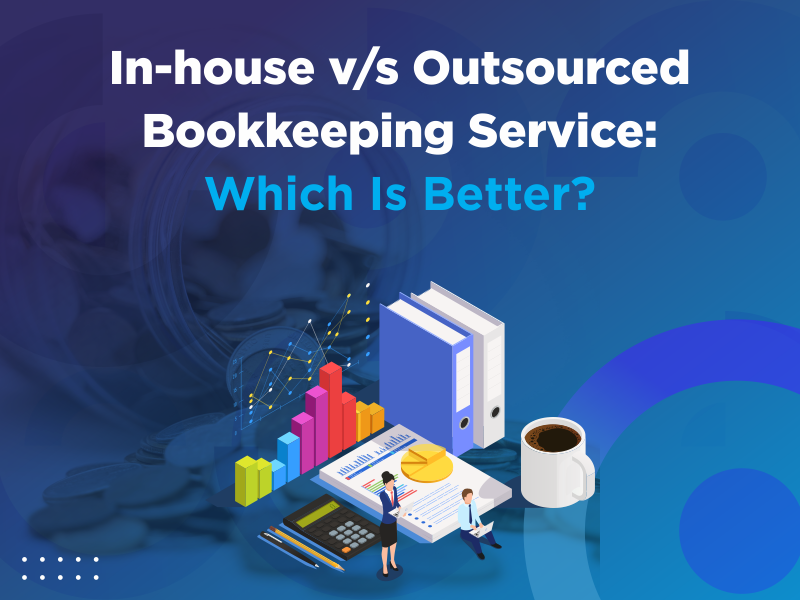
For any business to thrive, Outsourced bookkeeping holds paramount importance. It is an extensive process that tracks the business’s day-to-day financial transactions such as purchases, sales and withdrawals. Initially, it used to be carried out through paper documents. However, it has been digitized to several other formats.
Importance of Bookkeeping In A Business
Tracking every purchase and sale of an inventory or service helps run a successful business. It serves the following benefits to a business.
- Monitor your cash flow
- Plan for taxes
- Access financing
- Manage overhead costs
- Pay employees according to their terms of employment
- Meet the government’s ever-changing tax legislations
- Prepare for the tax season
Now, there are prominently two options in front of you if you’re looking for a way to manage your business books. You can either hire an in-house bookkeeper or outsource the bookkeeping operations to any third party (called outsourcing).
Since both are widely preferred by businesses across the globe, I’ll discuss the pros and cons of both approaches to present a clear picture of the two.
But before that, let’s define in-house and outsourced bookkeeping services.
In-house bookkeeping:
An in-house bookkeeper is an individual hired by the company to track and organize its day-to-day financial transactions. This includes recording invoices from suppliers, receiving money from customers, paying bills, making payroll entries, closing out accounts at the end of each month, and likes.
Outsourced bookkeeping service:
When the business hands over its bookkeeping tasks to a third party, it’s called utilizing outsourced services.
Let’s look at the key advantages and disadvantages of both approaches of bookkeeping.
Advantages Of In-house Bookkeepers
1. No need to transfer money between accounts
With an in-house bookkeeper, your funds remain in your business bank account throughout the month i.e., no money transfer occurs between accounts. It becomes important if you have restrictions on how much money can be withdrawn or moved between accounts or if you have strict cash flow needs.
2. Records remain updated at all times
With an in-house bookkeeper, you get the surety of getting all transactions recorded as soon as they occur instead of waiting for the invoices to arrive from suppliers or payments to arrive from the consumers.
3. 24/7 access to your records
The most critical advantage of having a bookkeeper in-house is that you can access your financial information or records at any time.
Disadvantages Of In-house Bookkeepers
1. The hiring & training process takes time & is costly
Going through the tedious hiring process is the main disadvantage of choosing the in-house model of bookkeeping over outsourcing. Finding a bookkeeper knowledgeable about the latest accounting principles, modern tools for entering data into a system, and industrial experience further lengthen the hiring process. In addition, training them costs even more time.
2. It takes time for the bookkeeper to enter transactions in the accounting system
It’s much faster for an outsourced bookkeeping expert to enter transactions in the computerized accounting system than for an in-house bookkeeper.
3. Less control over how each transaction is recorded
Most businesses require a team of bookkeepers and not just a single individual. Thus, when there are two or more individuals involved, potential errors are inevitable. The same doesn’t happen when only one person enters data because there isn’t anyone else to make errors.
Advantages of outsourced bookkeeping services
1. No startup costs
The best advantage of outsourced bookkeeping services is their low costs. You don’t have to pay any extra fees to use the outsourced bookkeeping services, whereas hiring a bookkeeper will cost you some money up-front.
2. Outsourced services are ready to start working for you quickly
Since there is nothing sort of training to be given, it is usually within 24 hours of signing the contract that the outsourced team takes over your books unless they have a large backlog of business.
3. Outsourced bookkeepers are experts in their field
It’s a fact that when you outsource, you get access to industry experts holding hands-on experience in their field. The same is true when you outsource bookkeeping. On average, an outsourced bookkeeper brings five to eight years of experience to your company.
Disadvantages of outsourced services:
1. No access to expert accounting knowledge
Outsourced bookkeeping services don’t provide business advice. Hence, you won’t know what questions to ask when reviewing your information with them.
2. Lack of communication
When work is outsourced, you may find it difficult to communicate regularly. This sometimes can bring a bit of misunderstanding between you and the bookkeeper.
3. Risk of security and frauds
Bookkeeping involves sensitive financial information and trusting someone with such information can be a bit of a problem. Hence, relying on an outsourcing company comes with providing a third party with all the confidential information that you (and no one) would not want to let loose.
4. Time and distance
No matter how best bookkeeping services are being offered to you by the outsourcing partner, there is no way that they will be present in your office. Thus, communicating any changes after you review the books may take a little extra time. This isn’t the case with having someone locally in your office.
To sum it up!
The decision about whether to outsource your bookkeeping operations or keep them in-house varies from company to company. Before finalizing any of these approaches, you must weigh the pros and cons of each option as discussed above besides how much time you have available.

